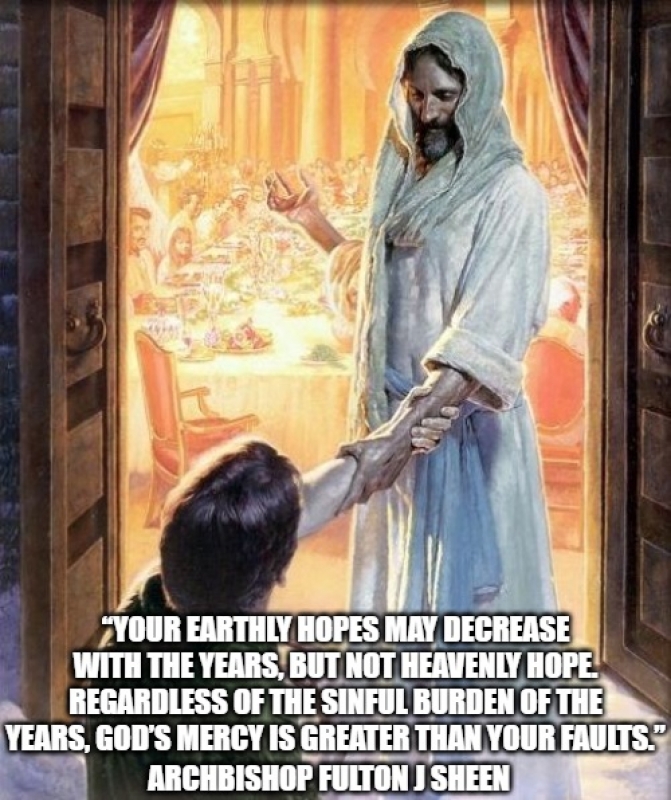28th Sunday in Ordinary Time (Year A) - 15 October
15th October 2023

28th Sunday in Ordinary Time (Year A) - 15 October
“Your earthly hopes may decrease with the years, but not heavenly hope. Regardless of the sinful burden of the years, God’s mercy is greater than your faults.” Venerable Fulton J Sheen
A reflection on today's readings by the late Pope Benedict XVI in his homily delivered on Sunday 9 October 2011:
"This Sunday’s liturgy presents a parable to us that speaks of a wedding banquet to which many were invited. The First Reading, from the Book of Isaiah, prepares the ground for this theme, for it speaks about the banquet of God. It is an image — the banquet — often used in the Scriptures to indicate the joy in communion and in the abundance of the Lord’s gifts, and it gives some idea of the celebration of God with humanity as Isaiah describes: ‘On this mountain the Lord of hosts will make for all peoples a feast of fat things, a feast of wine on the lees, of fat things full of marrow, of wine... well refined’ (Is 25:6). The Prophet adds that God’s intention is to put an end to sadness and shame; he wants all people to live happily in love of him and in mutual communion. Therefore his plan is to eliminate death forever, to wipe away the tears from all faces, to take away once and for all the dishonourable condition of his people, as we heard (vv. 7-8). All this awakens deep gratitude and hope: ‘Lo, this is our God; we have waited for him, that he might save us. This is the Lord; we have waited for him; let us be glad and rejoice in his salvation’ (v. 9).
"In the Gospel, Jesus speaks to us of the answer that is given to the invitation of God — represented by a king — to take part in this marriage feast (cf. Mt 22:1-14). Many guests were invited but something unexpected happens: they refuse to take part in the celebration, they have other things to do; indeed, some of them show contempt for the invitation. God is generous to us, he offers us his friendship, his gifts, his joy, but often we do not welcome his words, we show greater interest in other things and put our own material concerns, our own interests, first. The king’s invitation even meets with hostile and aggressive reactions. Yet this does not impede his generosity. He is not discouraged and sends his servants out to invite many other people. The refusal of those invited first causes the invitation to be extended to everyone, even the poorest, the abandoned and disinherited. The servants gather together those they find and the wedding hall is filled: the king’s goodness knows no bounds and all are given the possibility of answering his call. However, there was one condition in order to attend this wedding feast: that the wedding garment be worn. And, on entering the hall, the king notices that someone has not wished to wear it and for this reason bars him from the banquet.
"I would like to reflect for a moment on this point with a question: why did this man accept the king’s invitation, enter the banquet hall, find the door opened to him but not put on the wedding garment? What is this wedding garment? At the Mass of the Lord’s Supper, in Coena Domini, this year I mentioned a beautiful commentary on this parable by St Gregory the Great. He explains that the guest had accepted God’s invitation to take part in his banquet, that in a certain way he had faith which opened the door of the banquet hall to him, but he lacked something essential: the wedding garment, which is charity or love. And St Gregory adds: ‘Therefore each one of you in the Church who has faith in God has already taken part in the wedding feast, but cannot claim to wear the wedding garment unless he jealously guards the grace of love’ (Homily 38, 9; PL 76, 1287). And this garment is woven symbolically on two looms of wood, one above and one below: love of God and love of neighbour (cf. ibid., 10: PL 76, 1288). We are all invited to be the Lord’s guests, to enter his banquet with faith, but we must put on and take care of the wedding garment: charity, to live in the profound love of God and neighbour.
"To you, lay faithful, young people and families I say: do not be afraid to live and to witness to faith in the different sectors of society, in the many contexts of human life! You have every reason to show you are strong, confident and courageous, and this is thanks to the light of faith and the power of love. And when you encounter opposition from the world, make the Apostle’s words your own: ‘I can do all things in him who strengthens me’ (Phil 4:13). This is how the saints behaved that blossomed down the centuries. May it be they who keep you ever united and nourish in each one the desire to proclaim, with words and with works, the presence and love of Christ. May the Mother of God, whom you so deeply venerate, help you and lead you to profound knowledge of her Son. Amen!"
Prayer for the Attainment of Heaven
O God of all consolation, You Who see in us nothing but Your own gifts, I entreat You to give me, at the close of this life, knowledge of the First Truth and enjoyment of Your divine majesty.
Most generous Rewarder, give to my body also the beauty of lightsomeness, responsiveness of flesh to spirit, a quick readiness and delicacy, and the gift of unconquerable strength.
And add to these an overflow of riches, a spate of delights, a confluence of all good things, so that I may rejoice in Your consolation above me, in a place of lowliness below me, in glorification of body and soul within me, in delight of friends and angels all around me.
Most merciful Father, being with You may my mind attain the enlightenment of wisdom, my desire, the fulfillment of its longing, my courage the praise of triumph.
For where You are is avoidance of all danger, plentitude of dwelling places, harmony of wills.
Where You are is the pleasantness of spring, the radiance of summer, the fecundity of autumn, and the repast of winter.
Give, Lord God, life without death, joy without sorrow, that place where reigns sovereign freedom, free security, secure tranquility, delightful happiness, happy eternity, eternal blessedness, the vision of truth and praise, O God. Amen. 💐🙏💖
Food for thought
"For many are called, but few are chosen."
What we hear here is quite scary. By faith we have all been called to come to the wedding of the Heavenly King, we believe in the mystery of his Incarnation and we profess it, we take part in the banquet of the divine Word; but behold, in the day of judgment, the King of righteousness shall come in. We know that we are called, but we do not know if we are elected. Each of us must therefore humble ourselves all the more deeply as he does not know if he is elected. Indeed, there are some who do not even begin to do good; others, which have started well, do not persevere. One leads a disorderly existence for most of his life, but returns shortly before the end of his life by the tears of severe penance; another leads a life of elected, and yet comes to go astray in the evil shortly before the end of his life. One begins his life well, and finishes better still; another throws himself headlong into evil from his earliest youth, and dies after never ceasing to become worse in the same disturbances. Everyone must therefore fear for himself with all the more anxiety because he does not know how much time he has left; for it is something that must be repeated often, without ever forgetting it: "Many are called, but few are chosen."
St Gregory the Great, Homily 38, 10 Feb 592.


